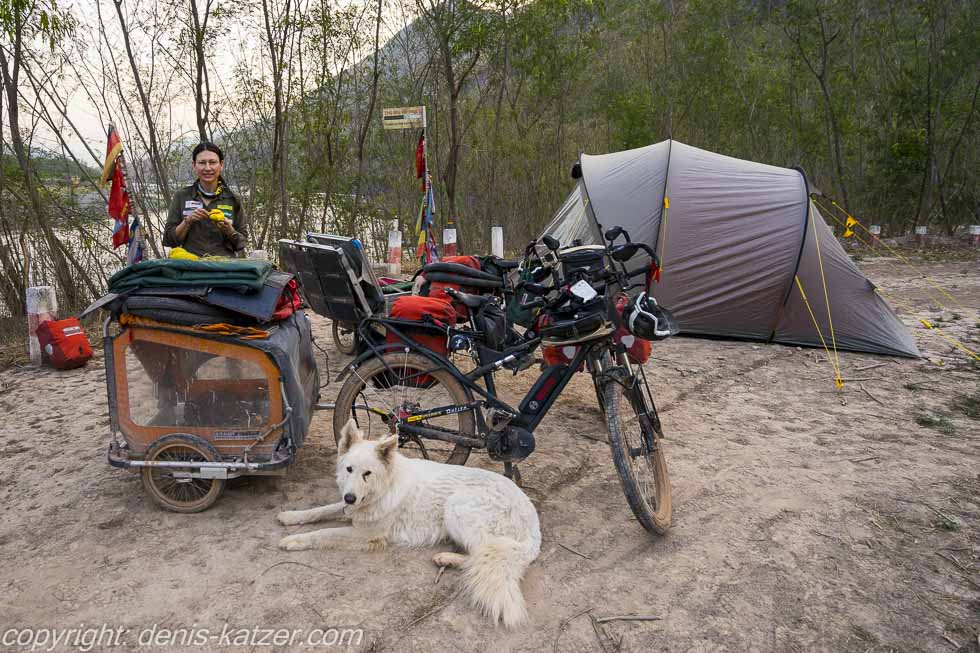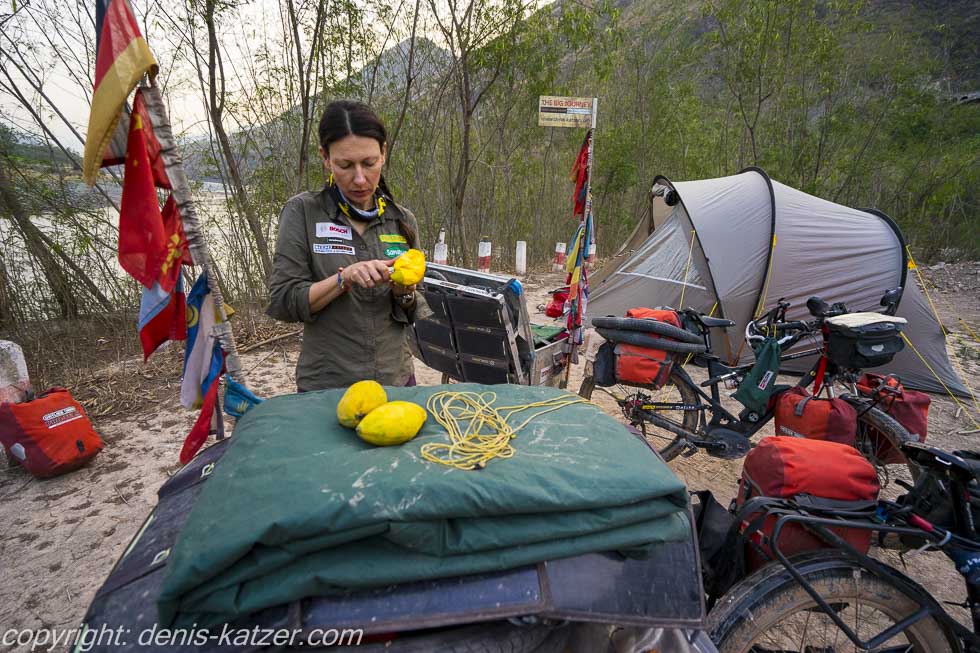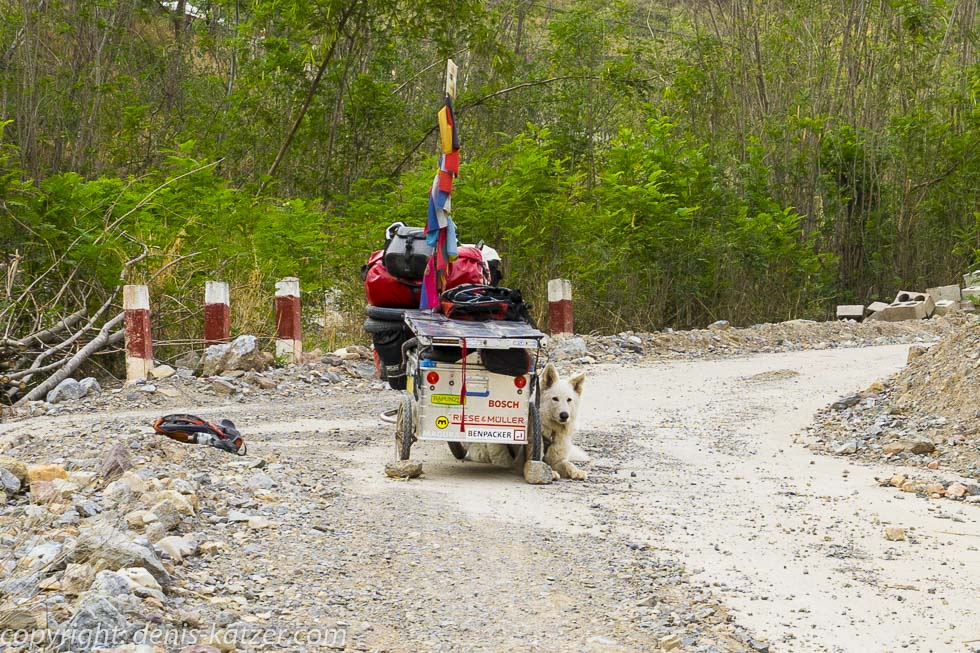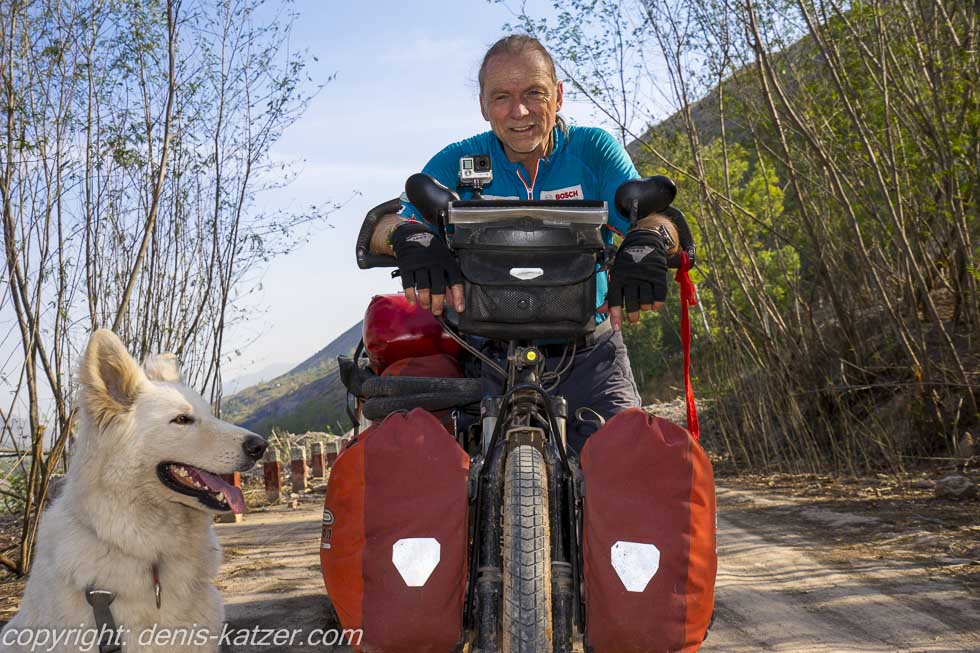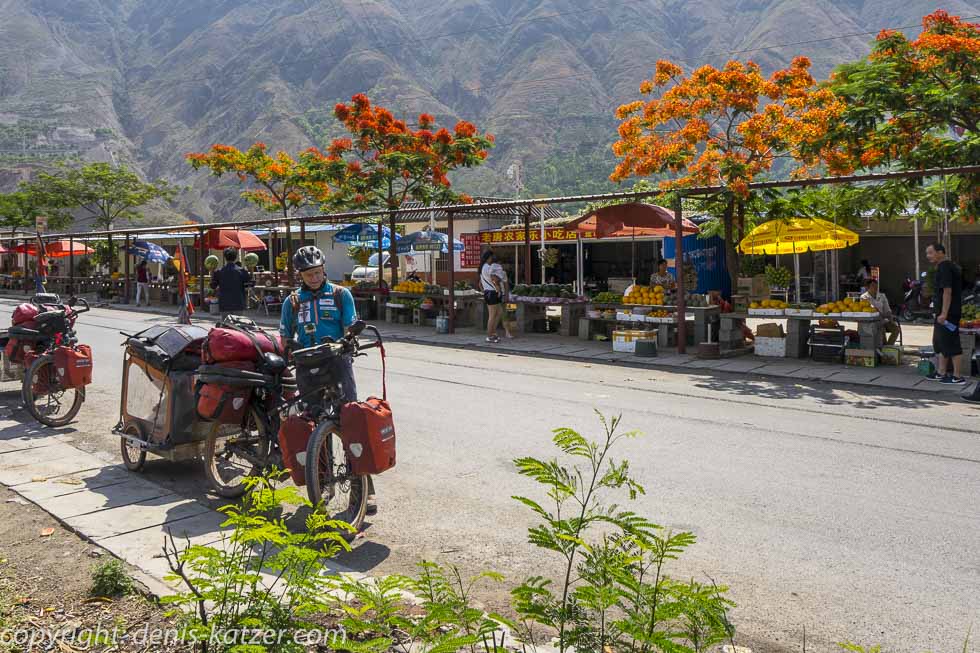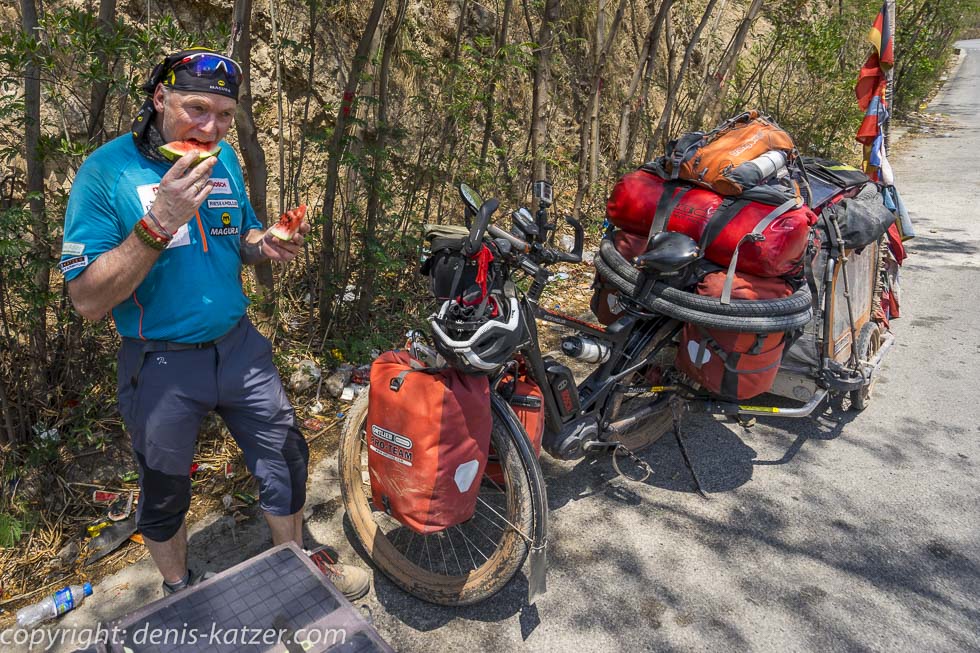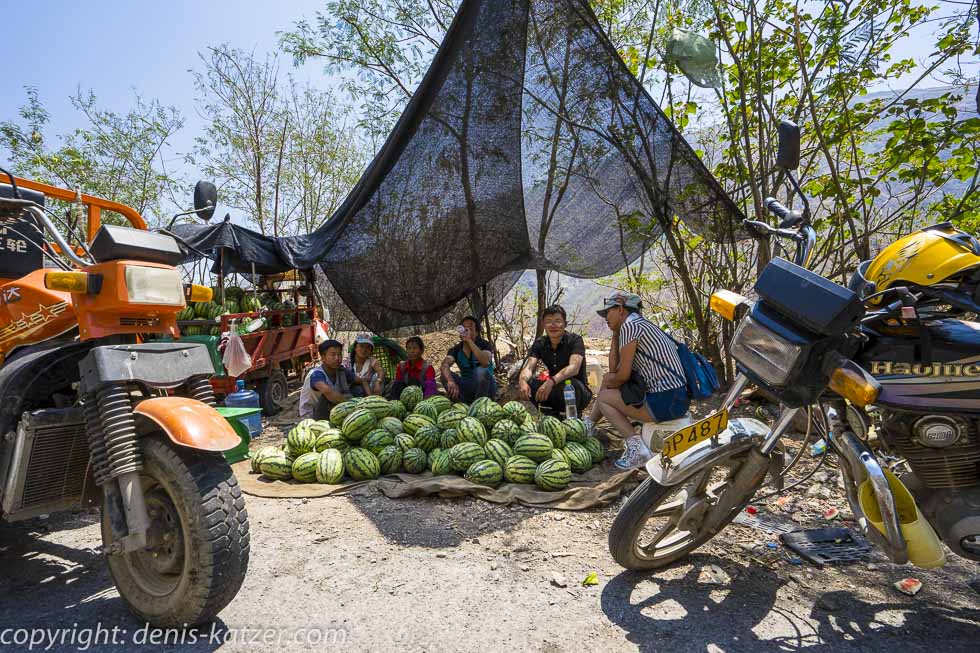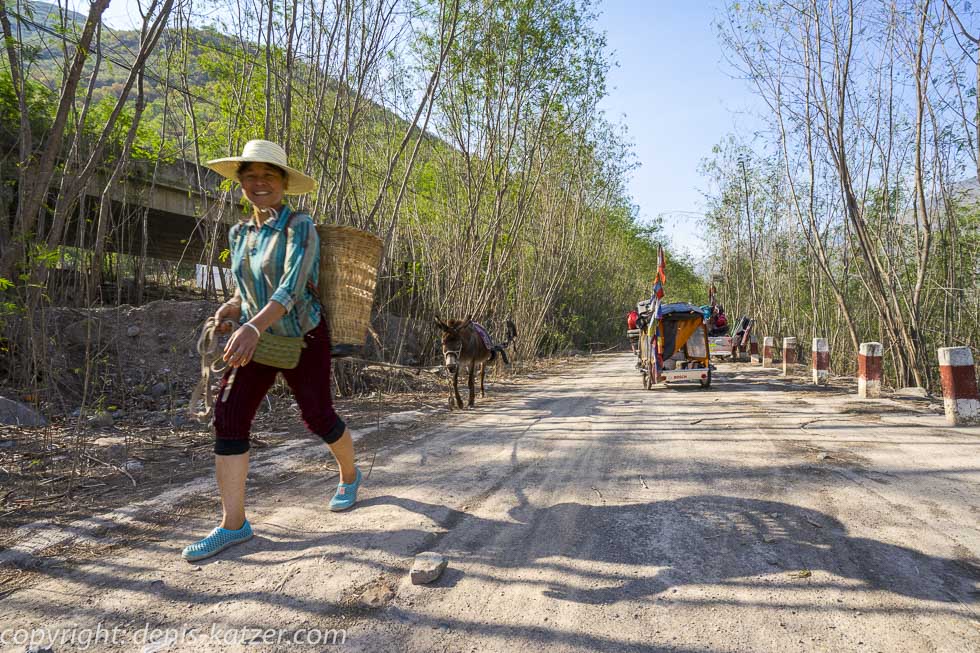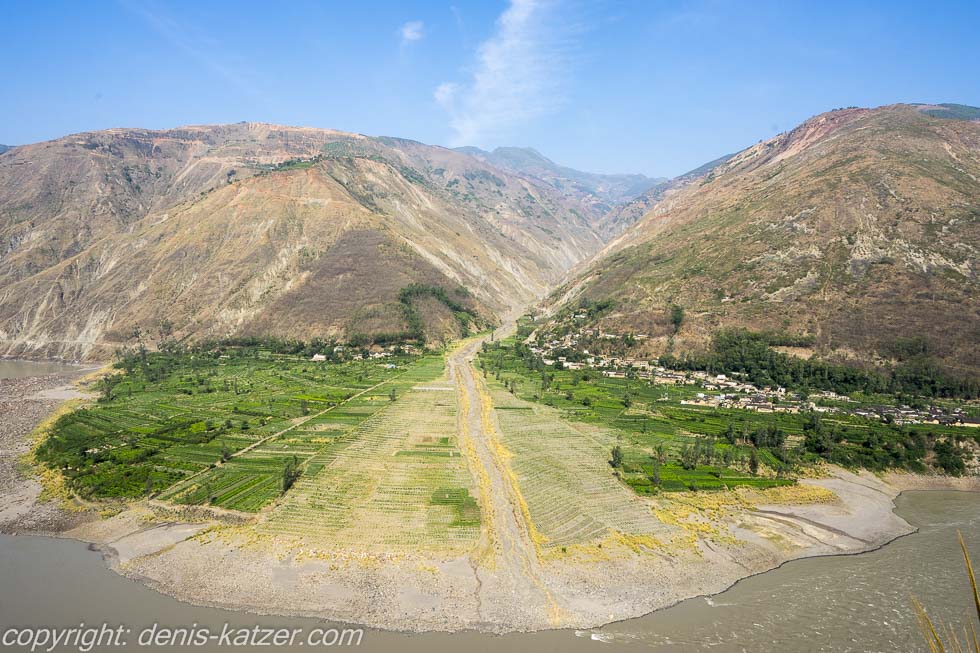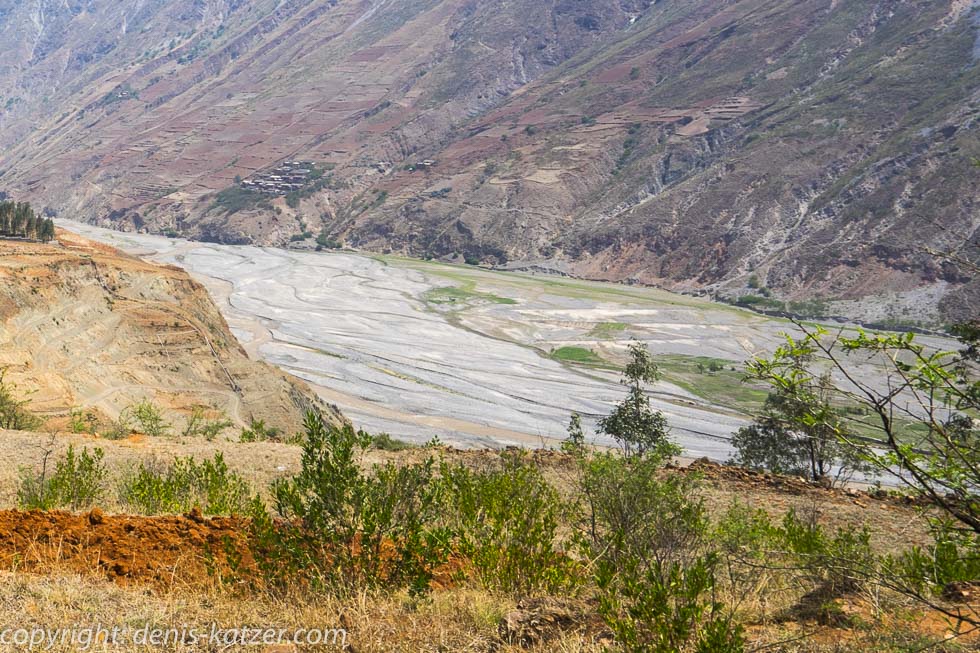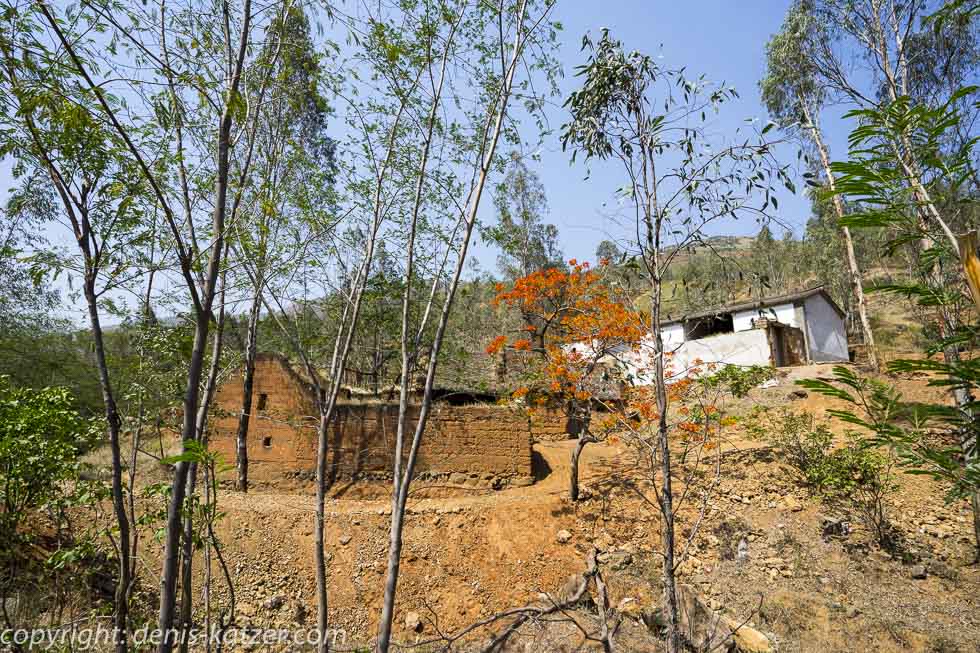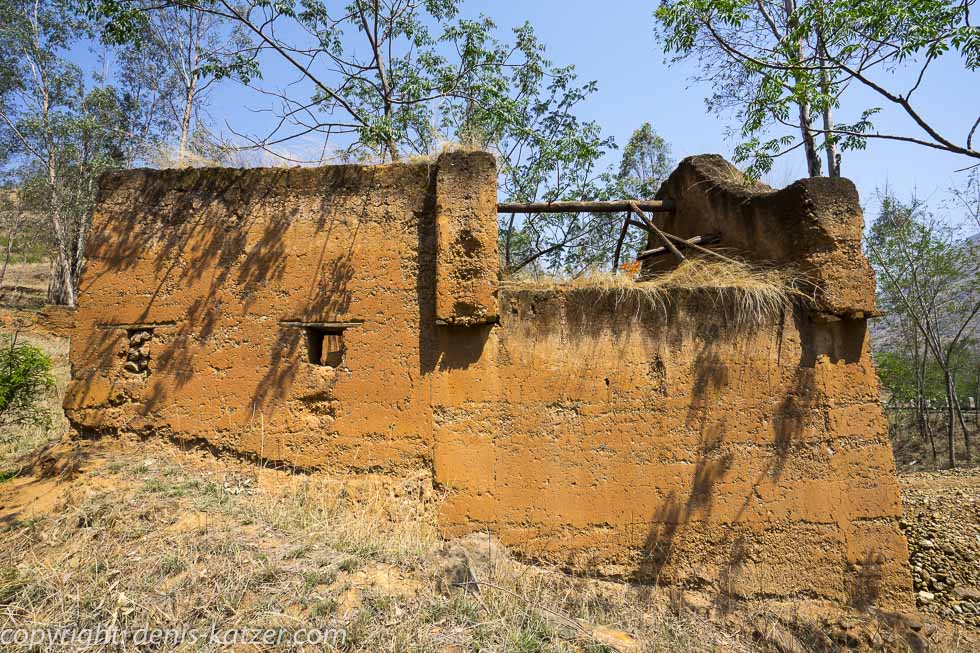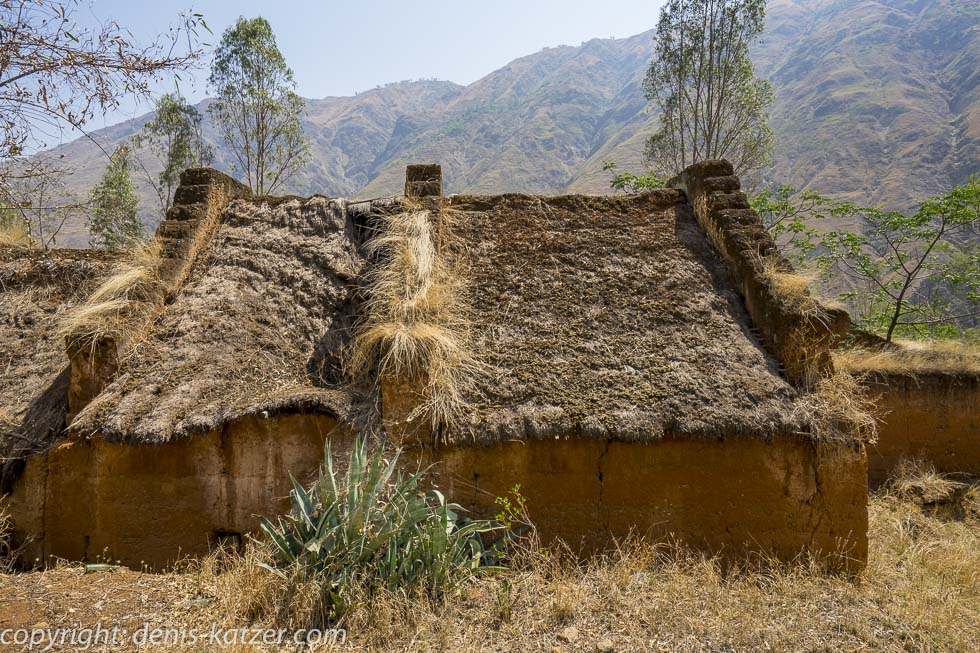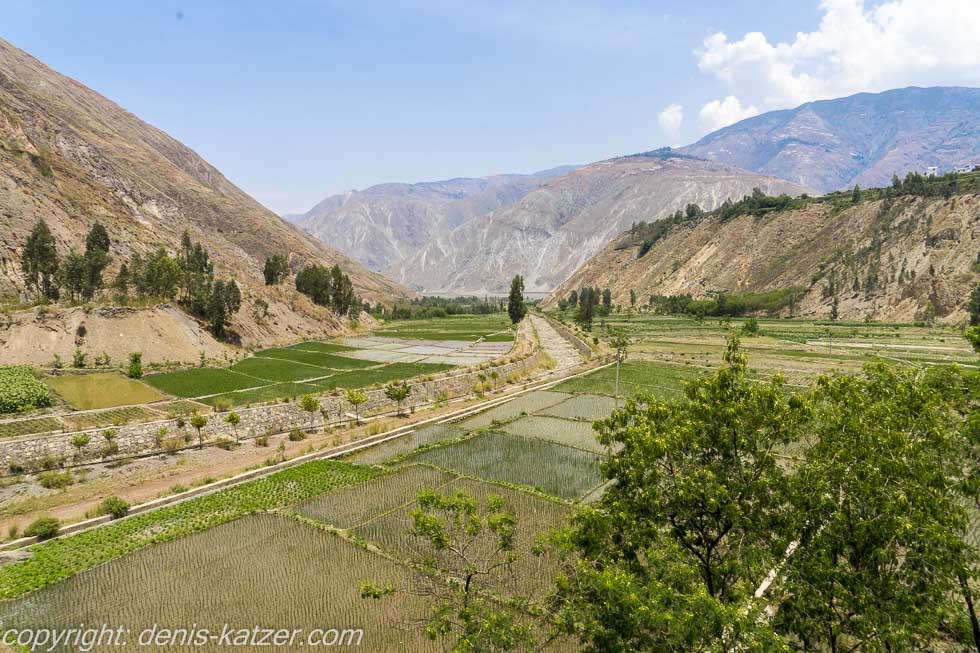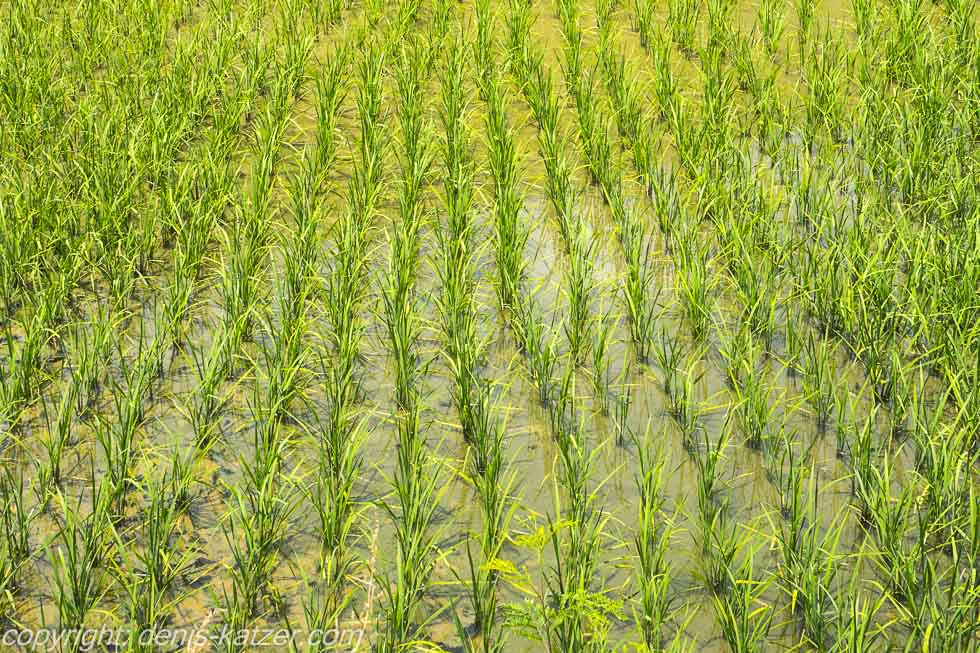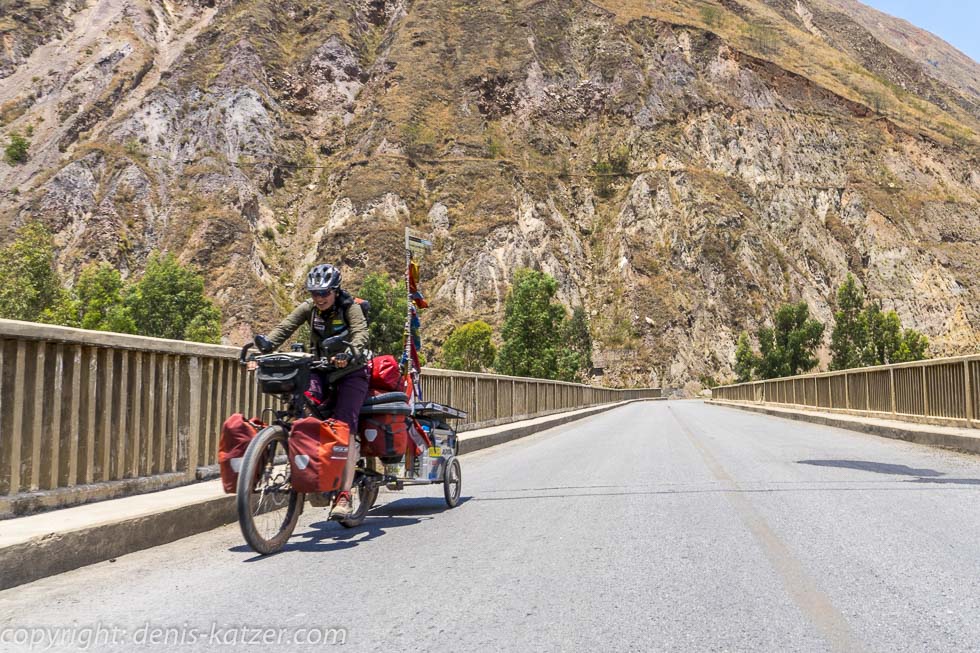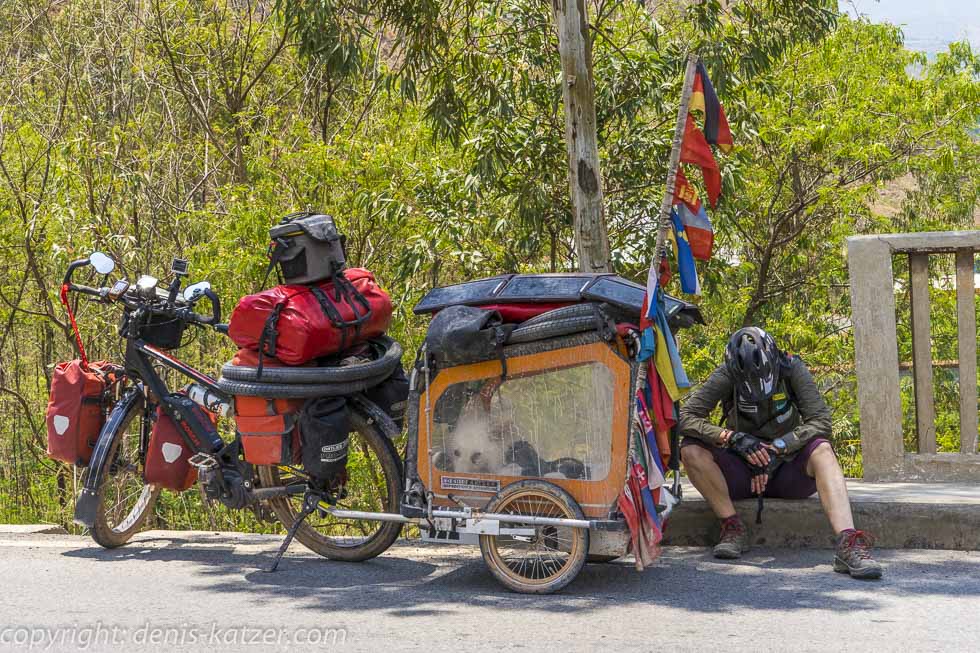
Superhuman powers, heat and an invisible border with Yunnan province
N 26°04'55.6'' E 103°10'18.9''
Date:
12.05.2016 until 13.05.2016
Day: 320 – 321
Country:
China
Province:
Yunnan
Location:
Tongduzhen
Latitude N:
26°04’55.6”
Longitude E:
103°10’18.9”
Daily kilometers:
76 km
Total kilometers:
16,785 km
As the crow flies:
70.63 km
Average speed:
19.3 km/h
Maximum speed:
53.8 km/h
Travel time:
03:56 hrs.
Soil condition:
Gravel / asphalt
Maximum height:
1.500
Total altitude meters:
36.393 m
Altitude meters for the day:
1.223 m
Sunrise:
06:23 a.m. – 06:22 a.m.
Sunset:
7:44 pm
Temperature day max:
38°C
Temperature Day Sun:
65° C
Temperature day min:
21°C
Departure:
07:30 a.m.
Arrival time:
5:00 pm
(Photos of the diary entry can be found at the end of the text).
Before sunrise, we struggle out of our sleeping bags, eat the last mangoes and pack up our camp. “Should I push?” asks Tanja. “Yes,” I reply. After just a few meters, I’m already cursing my decision to ride our bike trains down here yesterday. I totally underestimated the gradient. Sure, it’s usually easier to go down than up. Only with superhuman strength do we push the first bike up meter by meter. We take a break every 20 or 30 meters to catch our breath. Although the sun is still hiding behind a high mountain, the morning temperatures are unbearable. Especially because of the rainfall in the last few days, we think we can feel the humid air. It flows into our airways like a viscous liquid. As we are still suffering from a persistent cold, we almost cough our lungs out. “Okay, okay, it was a mistake,” I say, gasping for air, without having heard a word of complaint from Tanja. “We’ll manage”, she cheers us up and I’m glad not to be reproached for my bad decision. When we reach a section of path with less scree, I dare to ride the bike a few meters. “Are you sure?” asks Tanja. “No,” I reply and ask her to give the bike a good push to get the necessary speed so that I don’t fall out of the saddle in the first few meters. “Now!” I shout and pedal like a man possessed with Tanja’s push. My thighs immediately start to burn. Confident of victory, I think this will save us the further ordeal of pushing, when a single fist-sized pebble abruptly ends my ride. Miraculously, I don’t manage to fall. “All right?” calls Tanja. “Perfect!” I lie. “Not a good idea to want to drive,” I admit, which is why we now push our wheeled possessions further up to the pass road. After 1 ½ hours of hard work and an estimated 800 meters of distance, we reach the country road. “I’ll never look for a campsite like this again,” I swear to myself. We are actually so exhausted from the effort that we need to rest for the rest of the day. However, this is where our cycling day begins. Meanwhile, the sun has scrambled over the mountain top and hurls its hot rays down on us. To avoid burning ourselves, we apply sun cream to our sweaty skin. Then, after our beating hearts have calmed down, we swing ourselves into the saddle. After just a few kilometers, we spot clouds of dust that herald further roadworks. “Please don’t!” Tanja shouts behind me. Fortunately, these are only small sections that we overcome without difficulty.
Today too, the road along the Jinsha River winds its way over many a hill, so that we climb over 1,200 meters in altitude on this day. The landscape is picturesque again. Barren mountain flanks rise out of dark valleys. The lush green of the sparse vegetation contrasts with the gray of the rocks. The yellow-brown earth of the freshly ploughed fields, the brown-yellow water of the Jinsha and the deep blue sky, with a few lost white clouds about to be devoured by the merciless sun, lend the rugged landscape a unique beauty. Rice fields stretch along the floodplains of the Jinsah River in the valley. The millennia-old Chinese irrigation system guarantees a bountiful harvest.
According to my map, we are in the province of Yunnan, whose independence was only ended in 1253 by the Mongolian prince Kublai Khan. Somewhere we must have crossed the invisible border between Sichuan and Yunnan. Although we have been in China for over eight months now, we have only traveled to five of the 23 existing provinces. With its 394,100 square kilometers, Yunnan, which translates as south of the clouds, is about the size of Germany and Holland combined, and although I always thought China was overpopulated in every nook and cranny, only about 46 million people live here. In Germany and the Netherlands, on the other hand, the figure is just under 98 million. In no other province in China is the diversity of peoples as great as here. Almost 18 million people belong to ethnic groups such as the Yi, Bai, Hani, Dai, Zhuang, Miao, Hui, Lisu and Lahu, to name just a few of the 25 minorities living here. Despite the extinction of animal and plant species, biodiversity in this province is still very high. Even 250 strictly protected elephants still live here in the wild. Yunnan is characterized by the contrasts of nature. Snow-covered high mountains and valleys with subtropical vegetation offer the traveler an enormous variety. We would also like to visit the high mountain regions, but unfortunately we don’t have the time. We still have about 600 kilometers to go to the Vietnamese border, which we have to cover on our bikes, hoping that we won’t come across any more clay and gravel roads.
We stop to take a few pictures. Shepherds drive their herds of goats past us. “Protect yourselves from the sun,” they warn us, pointing upwards and at the bare skin of our arms. After 20 km we buy frozen water at a small roadside stall. Our thirst is almost unquenchable. As soon as the water has disappeared down our dry throats, it seeps out of every pore of our bodies to prevent them from overheating. Although today is also an exhausting day, we are aware of the uniqueness of the moment and enjoy life. During a breather, we observe a scattered road sweeper struggling to remove the remains of a rockfall with a long brushwood broom. Tanja greets him and gives him the thumbs up. The worker, who is certainly never praised for his work, beams all over his face and wishes us a good and safe journey.
“Look, they’re selling watermelons!” I shout delightedly and immediately apply my brakes. In the shade of a tree, I bite into the juicy flesh, “Damn tasty. Definitely the best watermelon of my life,” I enthuse. Because we are starving and thirsty, we eat all the melon until our stomachs almost burst. Then we continue to work our way through this extraordinary, sometimes bizarre landscape. The thermometer is set to the stop at 60 °C. I estimate the temperature in the sun to be at least 65°C. Tanja’s skin on her legs shows the first redness of a heat rash. We take a break in the shade of a small tree. Ajaci is doing amazingly well in his trailer despite his thick fur. As you can open your house on wheels at the front and rear, it is constantly cooled by the airstream. If he wasn’t a dog, you could sometimes be really envious, because most of the time he travels like a high prince in a comfortable sedan chair and is driven over all the mountains of China, protected from all weather conditions.
Dark storm clouds gather in the late afternoon. The power of the sun is immediately broken. We cycle through a fertile valley in pleasant temperatures. Grapes, onions, potatoes and other fruits are grown on a large scale. At a petrol station we ask if there is a hotel in the next town. “Another 10 kilometers,” we hear with relief, because the lush fields in this area don’t allow a square meter for pitching a tent.
It is 4 p.m. as we stand in front of a simple hotel. We negotiate for a while until the woman at reception allows us to check in with our dog and bikes. As soon as I have unloaded the bikes, the Chinese woman changes her mind and decides that our bikes have to be parked on the sidewalk. Nothing new for us. I click the bags back onto the bike. A couple of guys on an electric scooter offer to show us another hotel. We follow them for another eight kilometers and end up in front of a well-frequented hostel. We are relieved when the manager allows us to move in with everything we own. In the evening we sit in a park in tropical temperatures, drink a beer and watch the women dancing in public to loud music while their children roller-skate or race around the event site in small electric cars…
If you would like to find out more about our adventures, you can find our books under this link.
The live coverage is supported by the companies Gesat GmbH: www.gesat.com and roda computer GmbH http://roda-computer.com/ The satellite telephone Explorer 300 from Gesat and the rugged notebook Pegasus RP9 from Roda are the pillars of the transmission.
